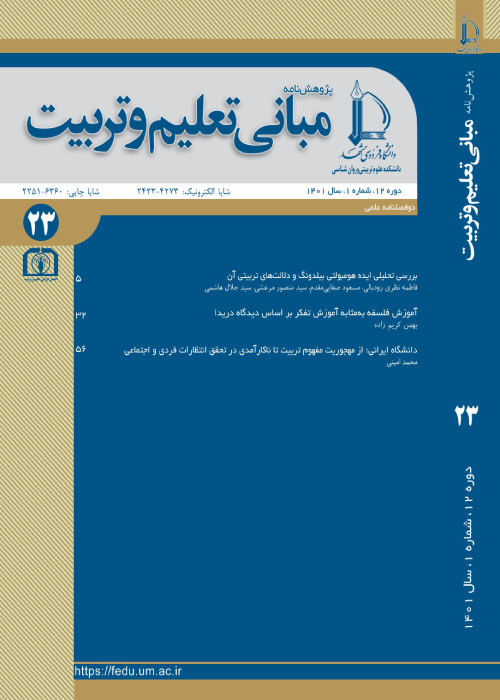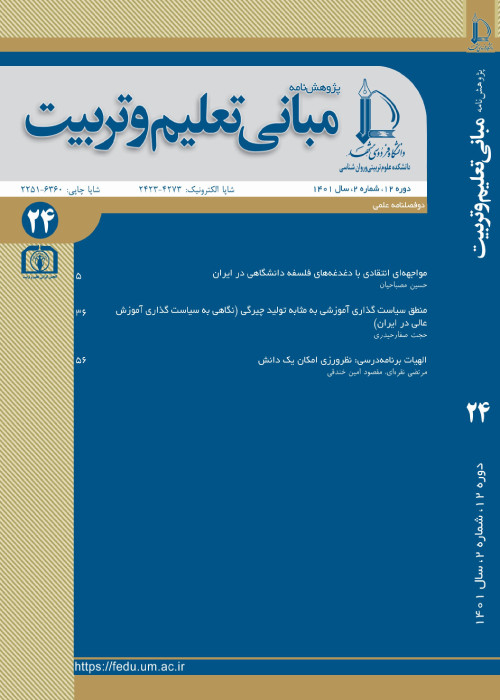فهرست مطالب

پژوهش نامه مبانی تعلیم و تربیت
سال دوازدهم شماره 1 (پیاپی 23، بهار و تابستان 1401)
- تاریخ انتشار: 1401/06/01
- تعداد عناوین: 3
-
-
صفحات 5-31
هدف اصلی این پژوهش بررسی تحلیلی ایده هومبولتی بیلدونگ و دلالت های تربیتی آن است. امروزه بیلدونگ به عنوان مفهومی بنیادین در تعلیم وتربیت مطرح است و این امر بدان جهت است که بیلدونگ چهارچوبی فلسفی برای مفهوم پردازی در باب رشد و تکامل انسان فراهم می آورد و این تکامل را به صورت هنجارین با تعلیم وتربیت مرتبط می سازد. یک تقریر از مفهوم بیلدونگ، تقریر هومبولتی آن است که این پژوهش با بهره گیری از روش تفسیر مفهومی و مفهوم پردازی و در نهایت تحلیل فلسفی، نخست شروط تحقق بیلدونگ و مولفه های آن از نگاه هومبولت را تبیین می کند؛ سپس با نشان دادن ارتباط این مولفه ها، مبانی و اصول تعلیم وتربیت را روشن می سازد. نتایج این پژوهش حاکی از آن است در اندیشه هومبولت، انسان به عنوان یک غایت، از ابتدا تحقق یافته نیست و نیازمند شدن است و این شدن درگرو عمل از روی اراده هدفمند و بی پایان است. تحقق بیلدونگ در این فرایند مستلزم آزادی، تعامل اجتماعی، تعدد و تنوع موقعیت ها، تعامل فراگیر با جهان و همچنین دستیابی به شخصیتی هماهنگ، همگون و متجانس است که به اعتقاد هومبولت هدف و غایت بیلدونگ هست. مبانی انسان شناختی ایده هومبولتی بیلدونگ نشان داد انسان موجودی پویاست و صرفا جسم نیست؛ بلکه وحدتی از حقیقت روح به همراه جسم است. او موجودی منحصربه فرد است که در متن جامعه و در تعامل با اجتماع به خود-تحققی دست می یابد و سرانجام غنای شرایط و موقعیت های متنوع است که استعدادهای نهفته انسان را شکوفا می سازد. اصول منتج از مبانی انسان شناختی ایده هومبولتی بیلدونگ شامل اصول «عاملیت انسانی»، «تاثیرپذیری دوسویه نیروهای درونی و بیرونی»، «تعامل اجتماعی» و «دیگری» است.
کلیدواژگان: ایده هومبولت، بیلدونگ، انسان شناسی، دلالت تربیتی -
صفحات 32-55
هدف این پژوهش بررسی دیدگاه دریدا درباره ضرورت آموزش فلسفه در مدارس و دانشگاه در جهت ارتقای وضعیت تفکر فراگیران است. پرورش تفکر، یکی از مولفه های بنیادین برای تحول آموزش است و آموزش فلسفه به مثابه آموزش تفکر از دیدگاه دریدا، زمینه فلسفی چنین تحولی را فراهم می سازد. با بهره گیری از روش توصیفی- تحلیلی و به منظور تبیین مسیله و پاسخ به پرسش ها، گزیده ای از مبانی فلسفی دریدا با تاکید بر ضرورت آموزش فلسفه در مدرسه و دانشگاه بیان شده است. یافته های به دست آمده حاکی از آن است که آموزش فلسفه شامل تفکر در مورد مدرسه و فلسفه آن است و تفکر فلسفی باید با تفکر در مورد خود فلسفه و فراتر از آن ترکیب شود تا به دانشگاه امکان فعالیت فلسفی و هم زمان به چالش کشیدن آن را بدهد. بنابراین با توجه به گستردگی و تصدیق کنندگی تفکر از منظر دریدا، آموزش فلسفه برای مدرسه و دانشگاه ضروری است و هر دو نهاد با توجه به تفاوت آن ها در سطح و نه در نوع، باید در امتداد یک پیوستار قرار گیرند و یک زنجیره را تشکیل دهند.
کلیدواژگان: آموزش فلسفه، آموزش برای تفکر، مدرسه، دانشگاه، دریدا -
صفحات 56-76
نقش و جایگاه نهاد دانشگاه در عرصه های اقتصادی، اجتماعی، فرهنگی و سیاسی مورد توجه و تاکید همه صاحب نظران مربوطه بوده و شواهد تجربی و پژوهشی فراوان نیز این واقعیت را تایید می کنند. با این همه به نظر می رسد که این نهاد مهم در ایران با مشکلات فراوانی مواجه است. آنچه در این مقاله به عنوان یکی از اصلی ترین عوامل معرفتی یا فکری مشکلات موجود آموزش عالی ایران مورد تبیین و مفهوم پردازی قرار گرفته غفلت از ماهیت، مفهوم و مضمون محوری فرآیند تربیت انسان در دانشگاه ایرانی و تقلیل آن به روندی ایدیولوژیک و دولت محور بوده است که در نتیجه آن نیازها و علایق دانشجویان و نیز انتظارات اجتماعی از دانشگاه (در سطوح محلی، منطقه ای و ملی) مورد غفلت قرار گرفته است. این مقاله در حکم تلاشی آغازین برای توجه دادن سیاست گذاران و برنامه ریزان آموزش عالی کشور به فهم عمیق تر فرآیندهای آموزشی و تربیتی و فراهم کردن زمینه ها، الزامات و اقتضایات گوناگون آن در محیط های دانشگاهی است. یافته های حاصل از این مطالعه توصیفی و تحلیلی، نشان می دهد که تربیت در مراکز دانشگاهی کشور به دلایل مختلف به ویژه اتخاذ سیاست های کمیت محور و غفلت از ابعاد کیفی آموزش به روندی کم تاثیر بر روی دانشجویان تبدیل شده و در عمل نتوانسته است در معنا و مفهوم اصلی خود که ناظر بر رشد و کمال همه جانبه، فهم و پذیرش آزادانه، آگاهانه و نقادانه مفاهیم و ارزش ها و به کارگیری آن ها در سلوک فردی و اجتماعی دانشجویان است، تجلی و عینیت یافته و در نتیجه از تحقق انتظارت فردی و اجتماعی خود قاصر است.
کلیدواژگان: دانشگاه ایرانی، تربیت، دانشجویان، سیاست گذاری آموزش عالی، یادگیری
-
Pages 5-31
The main purpose of this study is an analytical study of Humboldt Bildung's idea and its educational implications. Today, Bildung is proposed as a fundamental concept in education that has special implications for the contemporary philosophy of education. This is because Bildung provides a philosophical framework for conceptualizing human growth and development, and relates this evolution to education in a normative way. One interpretation of the Bildung concept is Humboldt's interpretation. This study uses the method of conceptual interpretation, concept development, and philosophical analysis to explain the conditions for the realization of Bildung and its components from Humboldt's point of view. Then, by showing the relationship between these components, it clarifies the foundations and principles of education. The result of this study indicates that in Humboldt's thought, man does not achieve a goal from the beginning he needs becoming and this becoming depends on willful, purposeful, and endless action. Achieving Bildung in this process requires freedom, social interaction, variety of situations, comprehensive interaction with the world, as well as achieving a harmonious and homogeneous personality, which according to Humboldt is Bildung's goal and end. The anthropological foundations of Humboldt-Bildung's idea show that man is a dynamic being, not merely a body, but a unity of the truth of the soul with the body. Also, in Humboldt's thought, every human being is a unique being who achieves self-realization in the context of society and with social interaction, and finally, it is the richness of various conditions and situations that flourishes man's latent talents. Principles derived from the anthropological foundations of Humboldt-Bildung's idea include "human agency", "mutual influence of internal and external forces", "social interaction" and "the other" principles. Education as Bildung can promote a new concept and view of education in the history of education in this region.
Keywords: Humboldt idea, Bildung, anthropology, educational implications -
Pages 32-55
In this paper, Derrida's viewpoint on the need to teach philosophy in schools and universities to improve the quality of student's thinking is examined. The development of thinking in students is one of the fundamental factors in the transformation of education, and teaching philosophy as thinking from Derrida's perspective provides the philosophical context for this transformation. In this study, descriptive–analytical research method is used. To explain the problem and answer the questions, a selection of the philosophical foundations of Derrida's thought is stated, emphasizing the need to teach philosophy for thinking in schools and universities. The findings suggest that teaching philosophy, which is according to Derrida a kind of education for thinking, necessarily includes thinking about the school and the question of what is the philosophy of education. Philosophical thinking should also be combined with thinking about _and beyond_ philosophy, to allow the university to practice philosophy and challenge it at the same time. Therefore, thinking, in the broad, affirmative sense Derrida ascribes to it, is essential to both school and university, then the two institutions should be placed along the same continuum, differing in degree but not in kind.
Keywords: Teaching Philosophy, Education for thinking, school, University, Derrida -
Pages 56-76
The role and position of the university institution in the economic, social, cultural, and political fields is the attention and emphasis of all relevant experts. Much experimental and research evidence also confirms this fact. However, it seems that this important institution in Iran is facing many problems. In this article, one of the main cognitive or intellectual factors of the existing problems of higher education in Iran has been explained and conceptualized. This problem shows the neglect of the nature, concept, and central theme of the process of human education in Iranian universities and reducing it to an ideological and government-oriented process, as a result of which the needs and interests of students as well as social expectations from the university (at the local, regional and national levels) has been neglected. This article is an initial attempt to pay the attention of the country's higher education policymakers and planners to a deeper understanding of educational and training processes and to provide its various contexts, requirements, and requirements in academic environments. The findings of this descriptive and analytical study showed that education in the university centers of the country has become a process that has little effect on students due to various reasons, especially the adoption of quantity-oriented policies and neglect of the qualitative aspects of education. In other words, the education process in practice has not been able to in its original meaning, i.e. all-round growth and perfection, free, conscious, and critical understanding and acceptance of concepts and values and their application in the individual and social behavior of students, As a result, this education unable to fulfill his personal and social expectations.
Keywords: Iranian University, Education, Students, Higher Education Policy, Learning


